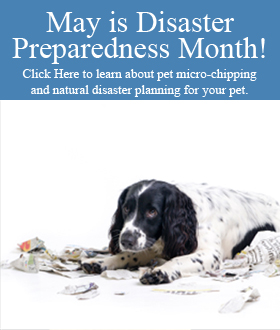Look at that face. Have you ever seen anything so cute? New pet owners are not the only ones excited about a puppy being added to the family. Your veterinarian will be just as happy to meet a new family member. Unfortunately, without proper education, especially for first-time puppy owners, that excitement can wane over a short period of time. Behavior problems are a major reason for owner surrenders in animal shelters. (Newly adopted puppies should be examined by a veterinarian shortly after adoption, whether purchased through a breeder, the local humane shelter or adopted from a friend. The first set of vaccines is recommended at 8 weeks of age with boosters every 4 weeks thereafter until complete, but that’s another story. )
It is suggested that puppies not be adopted until at least 7-10 weeks old and definitely not before 6 weeks of age. Waiting just a little longer will allow your new friend to learn some doggy skills with littermates and still be young enough to bond with a new family. Puppy owners are encouraged to expose their puppy safely to new and novel things, taking into account that stimulus intensity and frequency of encounters are important.
Dr. Debra Horwitz, Board Certified Behaviorist, has a few words of wisdom for new puppy owners:
1) Make rules and stick to them. If the couch is off limits, it is always off limits. If begging is unwanted, then feeding from the table should not occur.
2) Teach your puppy about the new world he/she lives in. Have regular exposure to new and different things, including people, places and objects. Keep the exposure appropriate and avoid overwhelming situations, like large groups, parades, lots of dogs (dog park), kids or very loud noises. Use food treats and praise to help your puppy associate good things with these events.
3) Puppies make mistakes and are very vulnerable to harsh, vocal and physical reprimands. Try to avoid punishment and if your puppy does something wrong and you did not see it, quietly remove him/her, clean up the damage and vow to supervise the puppy better in the future.
4) Children love puppies and it is best that new owners always supervise interactions with other people, especially children. Puppies need kind, gentle and humane interactions to learn that people are okay.
5) A puppy is a living, breathing animal and picking them up and constantly carrying them is inappropriate. Puppies need rest and to be able to recharge their batteries. Give them space and games should be calm and controlled and avoid getting a puppy overly excited.
6) Remember, what you have is a puppy, what you want is a well-behaved dog. It takes time, training, patience and supervision to end up with a good dog. Create a safe place for your puppy to be when he/she is unsupervised. There should be bedding, toys, food and water in his/her safe haven. Do not expect him/her to go very long without needing to go outside, about one more hour than he/she is old in months is a good rule of thumb.
7) Your puppy is learning all the time, keep training and introducing him/her to new things throughout the first year of life.
8) Play is an integral part of learning, schedule supervised daily play time both with toys and with people. Human interactive play should be safe and controlled. Do not allow mouthing and chewing on body parts or clothing. Gently remove the puppy and hand the puppy a toy. If this does not work, leave the area; the loss of a playmate is a powerful tool. Puppies love to chew; so offer different types of chew toys, rotating frequently for variety. Always check for loose parts and make sure they are safe and cannot be ingested.
Check back soon for a continuation on puppy training/interaction.





































